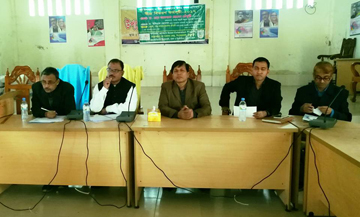RAJSHAHI, Dec 28, 2017 (BSS)- Speakers urged the farmers to bring more lands under wheat farming in Barind area to lessen the gradually mounting pressure on its underground water table.
They viewed the farmers should show their interest on promotion of less-irrigation consuming cereal crops instead of depending on only Irri-boro farming in the drought-prone area.
They were addressing a daylong farmers training on wheat production and its seed preservation yesterday.
Regional Wheat Research Station (RWRS) organized the training at Porsha Upazila Parishad hall room in association with the local office of Barind Multipurpose Development Authority (BMDA) and AFACI Seed Extension Project.
BMDA Chairman Dr Akram Hossain Chowdhury and RWRS Principal Scientific Officer Dr Ilias Hossain addressed the function as chief and special guests while BMDA Executive Engineer Abdul Maleque in the chair.
Upazila Vice-chairman Abdul Mazid Sarker, BMDA Assistant Engineers Rezaul Islam and Shahidul Islam also spoke on the occasion.
Dr Akram Chowdhury viewed that large-scale promotion of less-water consuming crops could be the effective means of mitigating water-stress condition in the dried area.
He told the farmers that wheat could be cultivated on seven to eight bighas of land with same amount of irrigation-water needed to irrigate one bigha of Boro rice through soil moisture utilisation and the best uses of the modern technologies.
Dr Chowdhury said the BMDA has a significant contribution in making the Barind area multiple cropping at present instead of single one through providing irrigation.
But, time has come to reduce the farming of Irri-boro paddy through promoting the less-water consuming wheat, maize, pulses, oilseed and spices. “We have to change the mandate of BMDA”, he added.
Dr Ilias Hossain said more emphasis should be given on expansion of short duration and high-yielding wheat varieties. Seed preservation and production training need to be strengthened.
GO-NGO collaboration has become an urgent need for the new variety expansion.



